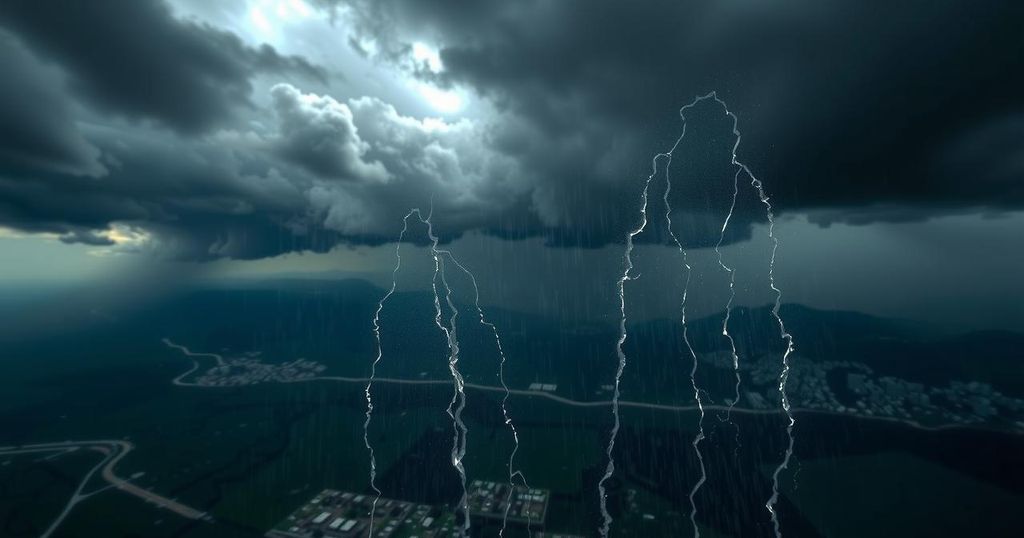Severe Weather Events Across the Globe: Rainfall Records and Temperature Extremes

A low-pressure system has caused unprecedented rainfall in Spain, leading to severe floods, particularly in Valencia and Jerez de la Frontera. South Africa’s thunderstorms have resulted in injuries and fatalities, while Japan records an extended period without snow on Mount Fuji. Australia experiences record-high temperatures in the north, with heat moving southward over the weekend.
A low-pressure system has recently inflicted significant rainfall across Spain, particularly affecting the Valencia region, where the nation has faced some of its most severe floods in decades. On Wednesday, Jerez de la Frontera recorded an unprecedented 115 millimeters of rain within a mere 24-hour period, marking it as the wettest day on record for the city. This intense precipitation has resulted in widespread flooding, leading to numerous road closures and heightened concerns regarding potential overflow from the River Barbate in Cádiz, as further rainfall is expected through the weekend. Although the urgent red weather warning for Valencia has now lapsed, the national meteorological service, Aemet, has preserved yellow and orange rainfall advisories for the southern and Mediterranean areas, as storm systems continue to affect these locations. In conjunction with the tumultuous weather in Spain, South Africa has also been beset by severe thunderstorms accompanied by strong winds, hail, and heavy rainfall. The South African Weather Service issued a yellow warning as the provinces of Limpopo and Mpumalanga experienced more than 40 injuries and four fatalities resulting from falling debris and collapsing structures. This weather event led to significant destruction, including damage to more than 30 educational institutions, alongside road closures and widespread disruptions to power services. Moreover, Japan is facing an unusual meteorological situation, as a new record for the length of time without snow on Mount Fuji has been established. The prior record was set in 1955, when the first snowfall of the season was observed on October 26. Typically, Mount Fuji experiences its first snowfall in early October; for instance, last year, the first flakes appeared on October 5. The absence of snow this year can be attributed to unseasonably warm conditions experienced throughout summer, coupled with elevated sea temperatures, which are expected to persist for several more days. In Australia, particularly in northern Western Australia, residents have been experiencing unusually high temperatures. Roebourne, located in the Pilbara region, recorded a staggering 45.3 degrees Celsius over the weekend, marking the highest October temperature witnessed in Australia in the past 15 years. Despite the subsequent arrival of a cold front from the north—anticipated to mitigate temperatures—warm conditions are projected to move towards central and southern Australia over the weekend. Adelaide is expected to experience temperatures around 34 degrees Celsius on Saturday, while Sydney could see temperatures soar to 36 degrees Celsius on Sunday, representing increases of 12 and 10 degrees Celsius above seasonal averages, respectively.
The article outlines significant weather phenomena occurring across various global regions, with an emphasis on Spain’s recent flooding events linked to a low-pressure system. Widespread rainfall has led to historical precipitation records in areas such as Jerez de la Frontera, while storm threats continue to loom over the southern regions. Concurrently, it highlights severe thunderstorms in South Africa that resulted in casualties and infrastructure damage, a record-breaking lack of snowfall at Mount Fuji in Japan, and extreme heat experienced in parts of Australia.
In summary, the recent weather patterns have displayed alarming trends, revealing troubling records in rainfall and temperature across multiple regions. Spain has been particularly affected, dealing with historical rainfall and ongoing flood risks. Similarly, South Africa’s thunderstorms have led to significant human and infrastructural losses, while Japan’s climatic anomaly continues to raise concerns. Meanwhile, Australia grapples with unexpected heat, further underscoring the urgency of understanding and addressing climate-related challenges worldwide.
Original Source: www.theguardian.com






